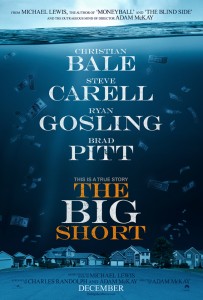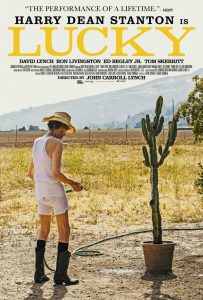“The truth is like poetry,
and most people fucking hate poetry”
When the credits for The Big Short started rolling on by, the words “Directed by Adam McKay” appeared. The immediate reaction I had was something like ‘Oh, look at that, the director has the same name as that guy who made the Anchorman films’. It was only while sitting down for a post-film coffee, scrolling through the IMDB app that my jaw hit the ground in realization that one of the best films of the year was made by the same man who gave us The Other Guys, Anchorman, and Step Brothers. This isn’t to say a bad word against these films, I love lamp as much as the next guy, but they’re not exactly what you’d call high-minded cinema. If Adam McKay can make a film as good as The Big Short which tackles subjects as serious as the Global Financial Crisis, unfettered human greed, and the pitfalls of capitalism with clarity and genuinely funny exposition, then he’s a filmmaker of substantial talent who has been hiding behind a façade of Will Ferrell style dorky humor for the better part of a decade (The Big Short is actually the first film directed by McKay that doesn’t star Ferrell).
Based on the book by Michael Lewis with a screenplay by Charles Randolph and McKay, The Big Short tells three interconnecting stories of the financial disaster of the mid-2000s. Michael Burry (Christian Bale) is a hedge fund manager who figures out that the U.S housing market with its system of sub-prime mortgages is a palace built on sand which will begin to fail in the not-too-distant future. Against the judgement of everyone around him he bets against all the major banks, something that had never paid off in the history of the USA. This gets the attention of high-flying banker Jared Vennett (Ryan Gosling) who soon teams up Mark Baum (Steve Carell), and over the next couple of years the team do the equivalent of stand in front of a house that’s just about to ignite and buy large amounts of fire insurance. This is just a taste of what this huge and thrilling story is like, and the huge and very impressive cast are bound to win many ‘best ensemble’ awards.
The best way to describe The Big Short is that it’s like the combination of the labyrinthine brilliance of Margin Call and manic energy of The Wolf of Wall St; all the financial jargon is handled in one of the most intriguing and hilarious forms of exposition seen in years. The film knows that no one outside of the financial industry knows what things like sub-prime mortgages, collateralised debt obligations and credit default swaps are, and explaining them can be tedious and complicated. To solve this, to use one scene as an example, the film simply cuts to Margot Robbie in a bubble bath who explains to camera what a sub-prime mortgage is. This happens a few times and finding out about the celebrity cameos that have been assembled for them is a lot of fun.
The reason that the film works so well is that you don’t need to know a thing about the GFC to enjoy it. Michael Lewis, whose book the film is based on, also wrote the book which was turned into Moneyball – which you didn’t have to know a thing about baseball to enjoy. The true story on which the film is based is astonishing. At first it seemed that the US housing market was like a house of cards, threatening to fall at any significant sign of trouble. When Steve Eisman (in the film renamed Mark Baum) and his team started looking closely the panic-inducing realisation hit: the entire banking sector had the structural soundness of a house of cards, on fire, with an InterContinental Ballistic Missile launched at it.
Another thing that makes this such an interesting and compelling film is that while it has its fun telling the audience about complicated financial theories, it does it alongside a passionate fury. McKay’s comment on the way the system works is as black and bitter as an espresso coffee, and he clearly relishes telling the general public about it. The level of criminality with which the entire financial industry operates is staggering. Everyone already knows this of course, but it’s only once a deep look is taken into it that you begin to appreciate just how bad it got in the lead up to the GFC. It was only when the dust had settled over the smoldering ruins of what Kevin Rudd termed the ‘economic shit-storm’ that anyone grasped what had happened. Five trillion dollars vanished into the ether, the entire economic system of capitalism had nearly died a violent shrieking death, and it became clear just how reckless and dangerous the current banking industry is.
What happened as a result? One man went to jail for doing what countless others had done and the government bailed out banks against the vote of Congress, with the tax payers footing the bill. Finally, in a closing scene which leaves a spine chilling sense of foreboding, we’re informed that the banking sector essentially hasn’t changed and is doing the exact same things – Led Zepplin’s ‘When the Levee Breaks’ plays over the closing credits and one lyric stands out with panic inducing clarity: “Crying won’t help you. Praying will do you no good”. All credit is due that a film can explain such a complicated subject with clarity and still make it entertaining.
This is the complete package; it’s funny, informative, angry and at times even scary. A film about people outsmarting banks, talking about mathematics and economic jargon doesn’t exactly sound like must-see material but don’t be afraid. The Big Short is a very early but very strong contender for being one of the best films of 2016, now with an added 5 Oscar nominations.
The Big Short is in cinemas 14th January through Paramount Pictures.





